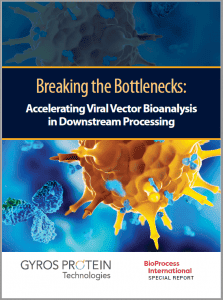- Sponsored Content
- Validation
- QA/QC
Breaking the Bottlenecks: Accelerating Viral Vector Bioanalysis in Downstream ProcessingBreaking the Bottlenecks: Accelerating Viral Vector Bioanalysis in Downstream Processing
September 11, 2020
Sponsored by Gyros
 The rise in popularity of viral-vector–based gene therapies and SARS-CoV-2 vaccines has created a shortage of manufacturing capacity, driving efficiency improvements to avoid bottlenecks in bioanalysis to support culture optimization and bioprocessing steps. To improve workflows in bioanalytical assay development and sample analysis, more efficient methods are needed that include higher throughput, simpler and more streamlined sample assay methods, wide dynamic ranges, and efficient data processing and interpretation. Gyrolab™ microfluidic, nanoliter-scale immunoassay systems provide an innovative, robust solution to high-performance bioanalysis of culture and bioprocessing samples. Gyrolab immunoassays are fully automated, utilizing a novel microfluidic, compact disk (CD)-based format with 96 microstructures each containing a flow-through affinity column for assay reagent binding and detection. Conversion of plate based enzyme-linked immunosorbent assays (ELISAs) to Gyrolab format dramatically reduces analysis time, often shortening assay development from weeks to days and reducing sample analysis time from days to hours. This report describes how the Gyrolab platform streamlines assay development and reduces time to results for lentiviral and adenoassociated viral vector titers and for bioprocessing host cell protein (HCP) impurity analysis.
The rise in popularity of viral-vector–based gene therapies and SARS-CoV-2 vaccines has created a shortage of manufacturing capacity, driving efficiency improvements to avoid bottlenecks in bioanalysis to support culture optimization and bioprocessing steps. To improve workflows in bioanalytical assay development and sample analysis, more efficient methods are needed that include higher throughput, simpler and more streamlined sample assay methods, wide dynamic ranges, and efficient data processing and interpretation. Gyrolab™ microfluidic, nanoliter-scale immunoassay systems provide an innovative, robust solution to high-performance bioanalysis of culture and bioprocessing samples. Gyrolab immunoassays are fully automated, utilizing a novel microfluidic, compact disk (CD)-based format with 96 microstructures each containing a flow-through affinity column for assay reagent binding and detection. Conversion of plate based enzyme-linked immunosorbent assays (ELISAs) to Gyrolab format dramatically reduces analysis time, often shortening assay development from weeks to days and reducing sample analysis time from days to hours. This report describes how the Gyrolab platform streamlines assay development and reduces time to results for lentiviral and adenoassociated viral vector titers and for bioprocessing host cell protein (HCP) impurity analysis.
Fill out the form below to read the complete report and learn more about Gyrolab immunoassays now.
You May Also Like






